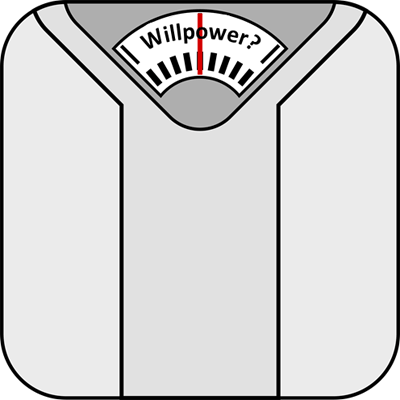 If you’ve ever been on a diet (or several of them), you’ve probably been told by some well-meaning bystander that all you need do is exercise a little willpower. You know, just push yourself away from the table. It seems simple enough. Yet even folks with superior self-control in others areas of their lives often fail to regulate their eating habits to produce weight loss. Think Oprah Winfrey. Staggering success achieved through extraordinary talent and discipline. Lots of help in the form of a personal trainer, chef, nutritionist, counsellor, and assistants. And yet the struggle remains.
If you’ve ever been on a diet (or several of them), you’ve probably been told by some well-meaning bystander that all you need do is exercise a little willpower. You know, just push yourself away from the table. It seems simple enough. Yet even folks with superior self-control in others areas of their lives often fail to regulate their eating habits to produce weight loss. Think Oprah Winfrey. Staggering success achieved through extraordinary talent and discipline. Lots of help in the form of a personal trainer, chef, nutritionist, counsellor, and assistants. And yet the struggle remains.
Roy F. Baumeister and John Tierney tackle this conundrum in Willpower: Rediscovering the Greatest Human Strength. They remind us that the body has a will of its own and reacts viscerally to what we do. It’ll go along with a diet once or twice. But then it’ll adapt, hoarding excess body weight even with reduced caloric intake. After all, evolution favors those who survive famines. If the body thinks that food might be scarce, it’ll do what it needs to do to address a projected shortfall. It doesn’t understand dieting for weight loss.
Dieting depletes willpower, even if we’re endowed with tons of it. Every time we go through the mental process of resisting foods that we’d like to eat, we draw down our reservoir of self-control. To resupply that energy, we need glucose. The body knows that the fastest way to produce glucose is sweets. So we crave sweets, causing a further drain on our willpower if we resist them. Talk about a Catch-22!
Baumeister and Tierney also shed light on the what-the-hell effect – a phenomena I know all too well! It says that when we’re watching what we eat, we make a mental note of the total calories that will pass our lips each day. When we blow the plan, we classify the day as a failure, eat whatever we want for the remaining waking hours, and vow to regain our virtue in the morning. Unfortunately, our overindulgence disrupts our biochemistry, messes with our sleep, and makes the next day’s task all the more difficult… which could well precipitate another what-the-hell effect.
Finally, our artificially regulated diets make it difficult for the body’s hormones to give us accurate clues on when we’re hungry and when we’re sated. Most of us simply eat at preset times during the day according to work and household schedules. So, we don’t know what it feels like to live in harmony with our body’s natural rhythm. We eat because it’s time to eat. We eat because the food is there. We eat because we’re bored. We eat because we eat.
What do Baumeister and Tierney suggest we do?
Focus on lifestyle changes that yield gradual weight loss and support long-term weight maintenance. Don’t shock the system into thinking it has been thrown back in time to the mid-19th century Potato Famine. Establish realistic goals, and eat sensibly and sustainably to attain them.
Weigh daily. Folks who take to the scales every day are more successful keeping weight off than those who don’t. They accept tiny fluctuations as a function of water retention without discouragement and nip the larger swings in the bud. Wearing fitted clothing also helps monitor the battle of the bulge!
Make highly specific plans to address high temptation circumstances. Use IF-THEN rules: “If I’ve had a bad day at work, then I will go to the gym before I go home.” “If I go to a restaurant, then I will order____.” If I go to a party, then I will _____.” Don’t waste brain cycles making decisions in the moment. Just follow the rules.
Postpone pleasure, don’t deny it. As Mark Twain said: “To promise not to do a thing is the surest way in the world to make a body want to go and do that very thing.” Rather, when craving sweets, tell yourself that you can have it later. Eat or drink something healthy in the meantime while savoring the prospect. If you still want sweets, offer yourself a small taste, not a big chunk!
Get back on the wagon immediately when/if you fall off. A momentary lapse doesn’t have to become a major setback. If you are tempted to succumb to the overeating abyss, find an enjoyable activity to distract you – e.g., walk the dog, put on music and dance around the living room, get fresh air while reading a book.
Work with your body’s natural rhythms. Plan meals around times when you are most likely to be hungry. Drink a glass of water roughly 20 minutes before mealtime to start filling up your stomach. Serve yourself modest portions and then eat slowly to give your body time to register that it’s getting full. Stop eating when you are sated. Don’t feel compelled to finish everything on your plate.
Brush your teeth early for bed to create an obstacle for late night snacking.